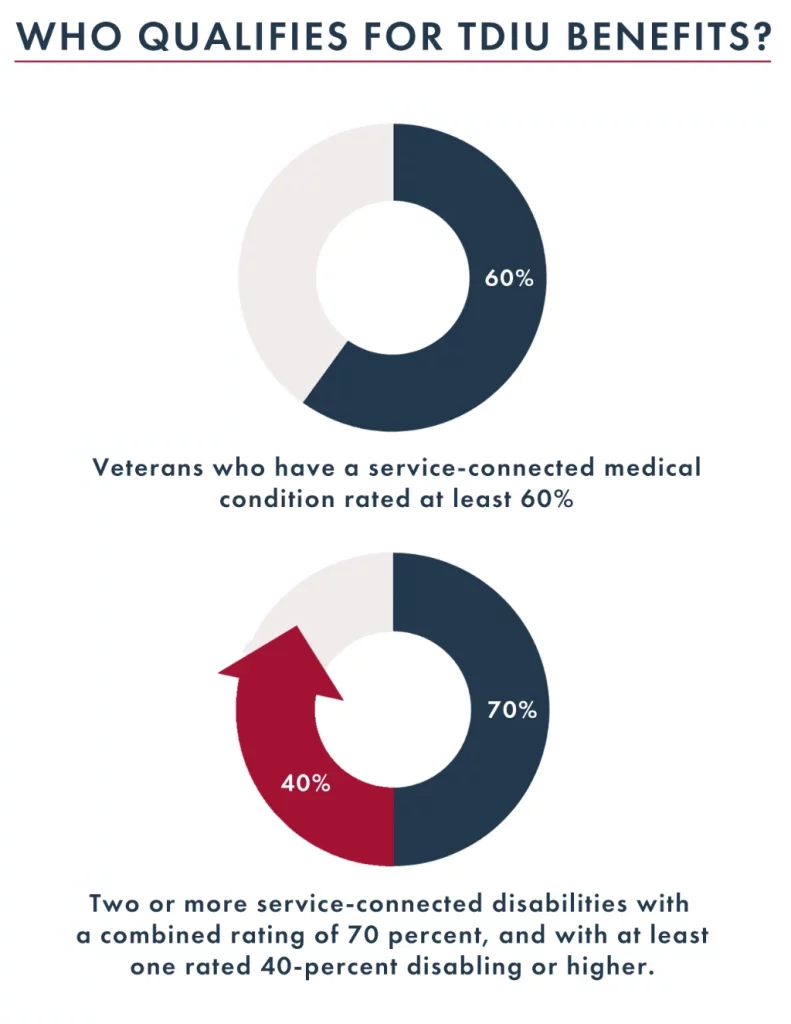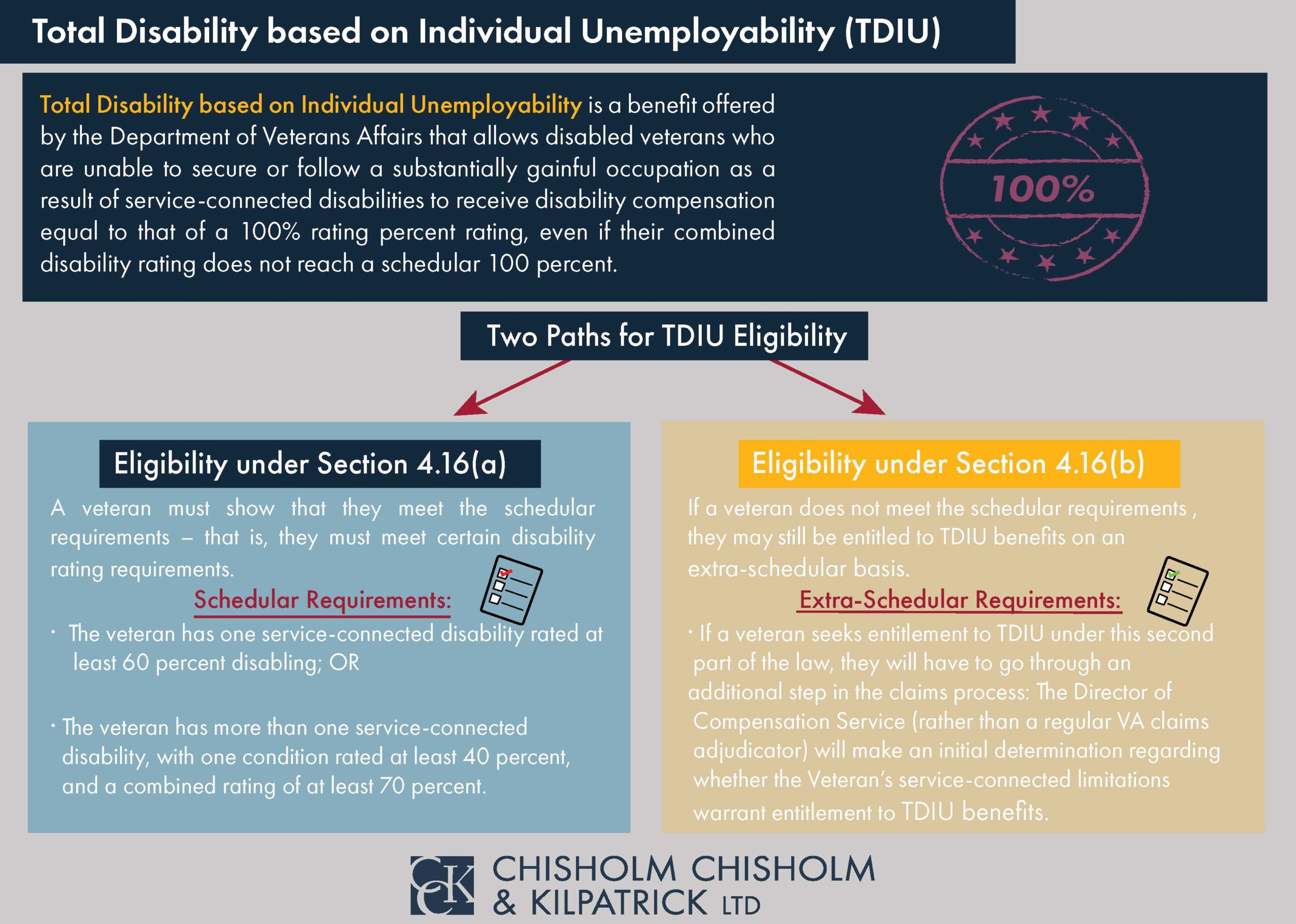Is Individual Unemployability Permanent?

CCK Law: Our Vital Role in Veterans Law
VA offers a disability compensation benefit called “Total Disability based on Individual Unemployability,” or TDIU, to veterans who cannot secure gainful employment due to service-connected disabilities. These veterans receive VA disability compensation equal to a 100 percent disability rating even though their combined VA rating is less than that. Veterans often associate a 100 percent rating with “permanent and total,” but TDIU is not a guaranteed disability benefit long-term. This results in questions like:
- How long does VA unemployability last?
- Is VA individual unemployability permanent?
- Can TDIU permanent and total be taken away?
- When does TDIU become permanent?
- Can TDIU be permanent and total?
- Will earning income cost you TDIU?
- Does TDIU end at retirement age?
This article will look at when and why VA decides to either terminate TDIU benefits or make TDIU permanent.
What Is Individual Unemployability (TDIU)?
To understand why VA may deny or revoke TDIU, it is important to know TDIU eligibility requirements. To receive individual unemployability benefits, a disabled veteran must prove that their service-connected disability prevents them from supporting themselves financially (known as “substantially gainful employment”).
There are two paths to getting TDIU benefits as a veteran: schedular and extraschedular.
- Schedular TDIU requires that either 1) the veteran has one service-connected disability rated at least 60 percent, OR 2) they have more than one service-connected disability with one condition rated at least 40 percent and a combined disability rating of at least 70 percent (the “70-40 rule”).
- If the veteran does not meet these rating requirements, but their rating does not adequately reflect the impact of the veteran’s conditions—for example, they need to be in the hospital often—then they may still qualify for extraschedular TDIU.

When Can VA TDIU Be Taken Away?
The most common situations are either that the veteran’s service-connected condition improves OR the veteran earns enough income to constitute “substantially gainful employment.”
- If VA reduces a veteran’s rating—for example, during a reexamination or reevaluation—then they may no longer meet the requirements for schedular TDIU. Note that this is not likely if the condition is a “static disability” or if rating protections
- If VA learns that the veteran reported income over federal poverty level (see “Can Working Cost You TDIU?” below), a veteran’s individual unemployability benefits may become subject to reduction or termination.

When Can Income Cost You TDIU?
If a veteran earns enough income to constitute “substantially gainful employment,” VA may revoke TDIU benefits. There are two exceptions: wages below poverty level or protected work environments.
VA states, “marginal employment exists when a Veteran’s earned annual income does not exceed the amount established by the U.S. Census Bureau, as the poverty threshold for one person, or on a facts-found basis, and includes, but is not limited to, employment in a protected environment, such as a family business or sheltered workshop, when earned annual income exceeds the poverty threshold.”
In other words, marginal employment is when:
- A veteran earns wages below the federal poverty level, or
- The veteran is earning more than the federal poverty level only because an employer is giving them special accommodations, or a “protected work environment” (for example, the employer allows them to take breaks whenever they need them, unlike other employees).
VA Unemployability Over 65: Does TDIU End at Retirement Age?
VA cannot take into consideration a veteran’s age when evaluating claims. In the case of unemployability, VA may ask only whether the veteran’s disability prevents them from working.
Therefore, even if a veteran is retired or has already reached retirement age but is unable to obtain gainful employment due to their condition(s), then they may still be eligible for TDIU.

Is VA TDIU Permanent and Total?
No, “permanent and total,” or P&T, is different from TDIU. P&T is based on a veteran having static disabilities (“permanent”) that VA has assigned an actual 100 percent combined rating (“total”). TDIU is based on unemployability. A veteran with a permanent and total rating would not need TDIU, as the compensation is the same and P&T does not have the same limitations in regards to income.
However, even if a permanent disability is not rated 100 percent, it does mean that a veteran will not lose TDIU due to their rating improving, which is one of the most common reasons to lose TDIU. However, a veteran with static disabilities can still lose TDIU status if they are able to find “substantially gainful employment.”
There are a variety of ways to be considered 100 percent disabled, but “permanent and total” is only one of them.
When Does TDIU Become Permanent?
VA ratings gain protections over time or after a certain age. Rating protections make it less and less likely that a veteran’s rating will be reduced (e.g., during a routine reexamination) and thus potentially make the veteran no longer able to meet the requirements for schedular TDIU.
Here are examples of rating protections:
- “20-year rule” (38 CFR 3.951 and 38 CFR 3.952): Do not reduce an individual disability evaluation that has been continuously rated at or above the current level for 20 years or more except in the case of fraud per 38 CFR 3.951(b). Measure the 20-year period of 38 CFR 3.951(b) from the earliest effective date of the combined or individual evaluations.
- “10-year rule” (38 CFR 3.957): If service connection for disability or cause of death has been in effect ten or more years (since effective date), propose severance only if the original grant was based on fraud, or it is clearly shown that the person concerned did not have the requisite service or character of discharge.
- “5-year rule”: If your rating has not changed for five years, VA can no longer reduce it unless your condition significantly improves.
- “55-year-old rule”: Per 38 CFR 3.327(b), VA is not supposed to schedule periodic reexaminations for veterans over 55 years old. This eliminates one of the main ways that ratings are changed.

What if VA Denies or Revokes Your TDIU Benefits?
Note that if VA wishes to reduce a veteran’s rating, thus threatening a schedular TDIU rating, it must follow several steps:
- Notify the veteran.
- Give the veteran 30 days to request a hearing.
- Give the veteran 60 days to submit new evidence.
- Then issue a rating decision based on medical evidence of an actual change in the veteran’s disabling condition.
- The veteran then has the usual appeal options (see CCK’s VA Claims and Appeals Process Interactive Tool).
If you have TDIU status and receive notice from VA that it intends to reduce your rating or revoke your TDIU rating due to income, consider contacting a VA-accredited attorney or advocate immediately.
Need Help with TDIU? Call CCK for a Free Case Evaluation
TDIU is a vague and complex area of veterans law, even for VA. You may meet all of VA’s requirements for TDIU and still be delayed or denied due to VA errors. You may also find yourself more likely to be forced to continue appeals into the court system, which is significantly different from internal VA claims or appeals processes.
Chisholm Chisholm & Kilpatrick has argued many of the cases that define veterans law today. We have recovered over $1 billion in wrongfully denied benefits and spent over 25 years learning to recognize VA’s errors and use both VA processes and the courts to force VA to apply their rules and regulations correctly.
If you have questions regarding your TDIU claim, do not hesitate to call us at (800) 544-9144 for a free case evaluation with a member of our team. We will analyze your case and see if we can assist.
Share this Post
